人教版七年级下册第九单元知识点
最新人教版七年级英语下册第九单元知识点讲解

Unit 9: What does he look like?一、词性转换1.curly反义词:straight2.tall反义词:short3.high名词:height4.thin反义词:fat5.glass复数:glasses6.act名词:actor actress7.sing名词:singer 8.describe名词:description9.different 副词:differently 名词:difference 10.real副词:really11.big反义词:smallExercise 1:二、重点词汇1. a little bit & a little & a bit1) 修饰形容词或副词时,三者可通用,但a little bit比后两者所表示的程度稍弱一点。
Today is a little bit / a little / a bit cold. 今天有点冷。
2)修饰不可数名词时,a little直接跟不可数名词,a bit需加of再跟不可数名词。
There is a little / a bit of water in the glass. 杯子里有点水。
3)a little 和a bit在否定句中意思恰恰相反。
not a little相当于very “很,非常”,not a bit相当于not….at all“一点也不”。
① He is not a little hungry. = He is very hungry. 他很饿。
② He is not a bit hungry. = He isn’t hungry at all. 他一点也不饿。
2. stop to do sth. “停下来去做某事”。
指停止原来做的事情,去做另一件事情。
stop doing sth. “停止做某事”,指停止正在做的事情,即不做某事了。
E.g. He stops to do his homework.He stops doing his homework.Class begins, please stop talking.We are all tired, stop to have a rest.3. remember/forget doing sth. 记得/忘记做过某事(事情已做)remember/forget to do sth. 记得/忘记要去做某事(事情还没做)E.g. Please remember to eat lunch.I am sorry, I forget to my homework.I remember playing computer with my sister yesterday.I forget calling you.4. no more & not….any more & no longer & not….any longer1) no more = not….any more表示数量和程度的“不再(增加)”,常修饰终止性动词。
Unit 9 单元复习知识点课件 人教版英语七年级下册

-- _________.
A. He is thin
B. She is a kind girl
C. She likes music D. She has good-looking
4. -- Lucy doesn’t have curly hair.
-- Yes, we can say she has _______hair.
There are a lot of people in the bus. 公共汽车上有很多人。
3. Also, they don’t always remember well. 而且,他们并不总是记得牢靠。
(1)当also用于句首时,其后往往有逗号与句 子的剩余部分隔开。这时,also用于修饰整 个句子,相当于汉语中“同时;还;而且”。
Unit 9 What does he look like?
单元复习知识点课件
Key sentences for describing people: (描述人的重点句型)
What does he/she look like? 1) He/She is of medium height/tall/short
A. How old is he
B. What does he do
C. What does he look like D. How is he
8. --Tom is not very heavy.
--Yes, I think we can say he is ______ heavy.
A. a little
Ⅰ.补全句子。
1. 他长得什么样?
_W___h_a_t_ __d_o_e_s__ he ___lo_o__k_ __l_ik__e__?
七年级下册第九单元知识点

七年级下册第九单元知识点七年级下册第九单元是关于“汽车和交通”的知识点。
以下是本单元的内容概述:
一、什么是汽车
汽车是一种能够自行驾驶的机动车辆。
它运用内燃机或电动机发动机,利用机械传动装置或电子传动装置,以轮胎为载体在公路、城市道路、乡村道路上行驶。
二、汽车有哪些部分
(一)车身:是汽车的骨架,由车架、行李箱、底盘和车门等部分组成。
(二)发动机:是汽车的核心部分,它将汽油或柴油等燃料燃烧产生的能量转化为汽车行驶所需的动力。
(三)变速器:是控制汽车速度和转向的机械装置,它在车辆运动中根据需要自动换挡以达到最佳的动力性和油耗效果。
(四)制动系统:包括刹车踏板、制动轮等零件,它们通过摩擦力转化为热能,使汽车减速和停车。
(五)悬挂系统:是汽车的重要部位,由减震器、支撑桥等组成,能够提高车辆的稳定性、行驶舒适性和安全性。
三、交通的种类
(一)陆路交通:包括步行、自行车、电动车、摩托车、汽车等。
(二)水路交通:包括轮船、帆船、游艇等。
(三)空中交通:包括民用航空和军用航空。
四、交通安全
交通安全是一项重要的社会问题,事关生命安全。
为了保障人员和财产的安全,在交通中应该注意以下几点:
(一)遵守交通规则和法律,注意交通信号灯的指示,遵循红灯停绿灯行的原则。
(二)酒后驾车一定要避免,严禁酒后驾车。
(三)正确使用安全带和头盔等交通工具。
(四)避免使用手机和其他电子设备一边行车。
五、小结
汽车和交通是我们日常生活中不可或缺的一部分,应该注意交通安全,学习汽车基本知识,维护良好的出行环境,为了自己和家人的安全出行。
最新人教版七年级下册英语Unit9知识点

人教版七年级下册英语U n i t9知识点------------------------------------------作者xxxx------------------------------------------日期xxxxUnit9 名词:height 身高;高度cinema 电影院glasses 眼镜actor 演员actress女演员person 人nose 鼻子mouth 嘴face 脸eye眼睛singer 歌手artist 艺术家way方式;路线end 结尾;尽头动词:may 也许;可能;可以put 放describe 描述形容词:straight 直的curly 卷曲的tall高的thin 瘦的heavy 重的little 小的medium 中等的handsome英俊的round 圆形的real 真正的;真实的副词:later 以后differently 不同地兼类词:tonight adv&n(在)今晚;(在)今夜each adj&pron 每个;各自another adj&pron另一;又一短语:(be)of medium height 中等身高a little 一点;少量look like 看起来像first of all 首先in the end最后知识点:1、tall 高的反义词 short矮的,常指人、动物、树、建筑物等很高a tall tree一棵高高的树a tall building 一栋高楼high 高的反义词low 低的,多指山高,也指空间位置或程度高,还可以指价格、速度、温度等a high mountain一座高山high price 价格高2、medium 中等的be of medium height 中等身高be of medium build 中等身材My uncle is of medium height。
我叔叔中等身高.区分:middle 中间的;中部的There is a tree in themiddle of hisyard. 他的院子中央有一棵树。
人教版七年级英语下册 Unit9 What does he look like单元知识点总结

Unit 9 What does he look like?一、短语归纳short hair 短发long hair 长发curly hair 卷发straight hair 直发be of medium height 中等身高be of medium build 中等身材a little 一点;少量look like 看起来像 a big nose 大鼻子a small mouth 小嘴巴 a round face 圆脸big eyes 大眼睛a long face 长脸the same way 同样的方式in the end 最后first of all 首先二、词组用法归纳1、”be going to” 表将来:主语+ be + going to do sth 某人打算做某事Ex:We are going to visit the Great Wall tomorrow. 明天我们打算去长城游玩。
4、小练:--- Hurry up! The movie is beginning.--- Don’t worry. There is still time left.A. littleB. a littleC. a few5、each:做形容词时,修饰可数名词单数,意为“每个;各自”Ex:Each school has its own library. 每一所学校都有它自己的图书馆。
三、语法归纳(一)询问及描述外貌:1、询问外貌:What do/ does sb look like? 某人长什么样?2、描述人的外貌的句型如下:(1)表示某人的个头或身材:主语+ be of +形容词+ height/ build.Ex:Our math teacher is of medium build. 我们的数学老师是中等身材。
(2)表示某人的高矮胖瘦:主语+be +形容词.Ex:She is short and thin. 她很瘦小。
七年级下册9单元重点知识点
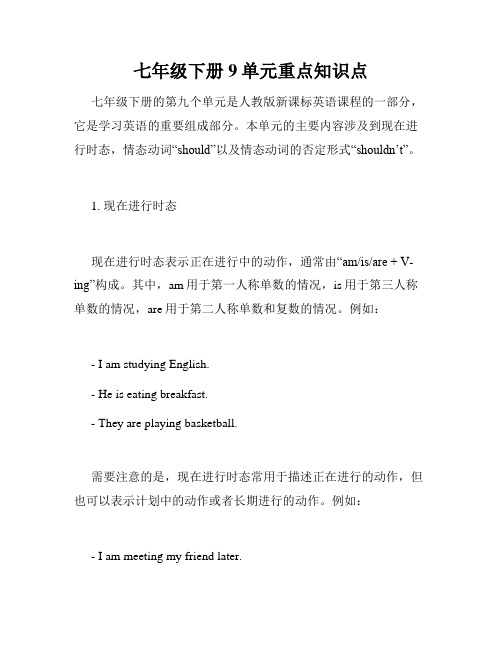
七年级下册9单元重点知识点七年级下册的第九个单元是人教版新课标英语课程的一部分,它是学习英语的重要组成部分。
本单元的主要内容涉及到现在进行时态,情态动词“should”以及情态动词的否定形式“shouldn’t”。
1. 现在进行时态现在进行时态表示正在进行中的动作,通常由“am/is/are + V-ing”构成。
其中,am用于第一人称单数的情况,is用于第三人称单数的情况,are用于第二人称单数和复数的情况。
例如:- I am studying English.- He is eating breakfast.- They are playing basketball.需要注意的是,现在进行时态常用于描述正在进行的动作,但也可以表示计划中的动作或者长期进行的动作。
例如:- I am meeting my friend later.- She is always talking about her job.2. 情态动词“should”情态动词“should”表示“应该”,通常用于建议、责任、义务、推荐等语境中,后接动词原形。
例如:- You should drink more water.- We should recycle more materials to protect the environment.需要注意的是,情态动词“should”不仅用于对自己的建议、责任、义务、推荐等语境中,也可用于对别人的建议、责任、义务、推荐等语境中。
例如:- You should tell your teacher about your problem.- She should take a break and relax.3. 情态动词的否定形式“shouldn’t”情态动词的否定形式“shouldn’t”表示“不应该”,用于表示反对或禁止某事物的发生。
构成方式为“shouldn’t+动词原形”。
例如:- You shouldn’t eat too much junk food.- We shouldn’t waste water.需要注意的是,情态动词的否定形式“shouldn’t”同样可用于对自己以外的人或者事物的反对或者禁止语境中。
七年级下册unit9知识点
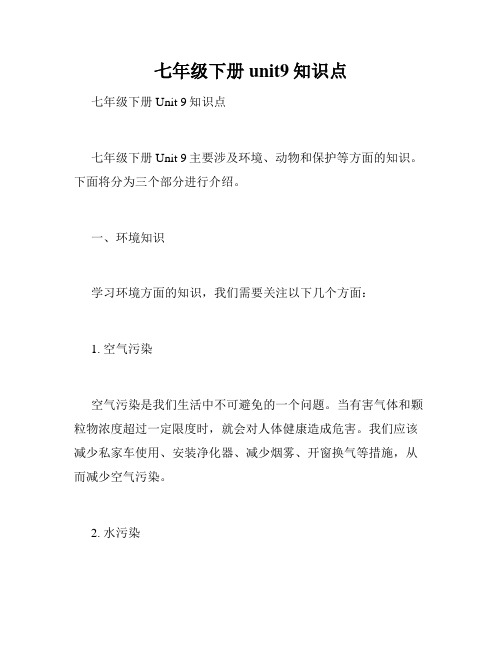
七年级下册unit9知识点七年级下册Unit 9知识点七年级下册Unit 9主要涉及环境、动物和保护等方面的知识。
下面将分为三个部分进行介绍。
一、环境知识学习环境方面的知识,我们需要关注以下几个方面:1. 空气污染空气污染是我们生活中不可避免的一个问题。
当有害气体和颗粒物浓度超过一定限度时,就会对人体健康造成危害。
我们应该减少私家车使用、安装净化器、减少烟雾、开窗换气等措施,从而减少空气污染。
2. 水污染水污染是另一个很重要的环境问题。
由于人类活动的影响,很多水资源已经被污染。
我们应该合理使用水资源、减少污染物排放、加强污水处理等措施来保护水资源。
3. 垃圾处理垃圾处理也是环保的一个重要方面。
我们应该注意垃圾分类、减少垃圾产生、妥善处理垃圾等,从而减少对环境的负面影响。
二、动物知识在学习动物方面的知识时,我们需要注意以下几点:1. 动物的习性不同的动物有不同的习性,我们应该了解不同动物的生活习性、食性、繁殖方式等。
2. 动物的分类动物可以根据不同的特征被分类为不同的类别。
根据不同的分类方式,动物可以被分为哺乳动物、鸟类、爬行动物等。
我们应该了解动物的分类,从而更好地了解不同动物的特点。
3. 动物的保护动物保护对于维护生态平衡非常重要。
我们应该尊重动物、合理利用动物资源、保护动物栖息地等措施,从而保护动物。
三、保护知识环境和动物保护都是保护知识的重要内容之一。
我们应该注意以下几个方面:1. 省资源资源是有限的,我们应该合理使用水、土、石油等自然资源,减少浪费,保护地球。
2. 碳排放碳排放是导致全球变暖的一个重要原因。
我们应该采取减少碳排放、使用清洁能源等措施,从而减缓全球变暖带来的影响。
3. 保护自然生态环境我们应该尊重自然、保护自然生态环境,努力建设和谐社会,促进可持续发展。
以上就是七年级下册Unit 9知识点的介绍。
希望同学们可以认真学习,了解各个方面的知识,为保护地球、维护生态平衡贡献自己的力量。
人教版英语七年级下册单元Unit 9 知识点+测试卷+思维导图
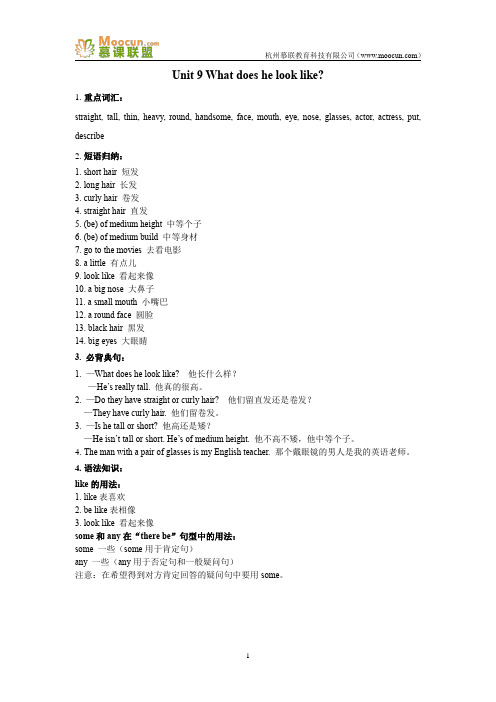
Unit 9 What does he look like?1.重点词汇:straight, tall, thin, heavy, round, handsome, face, mouth, eye, nose, glasses, actor, actress, put, describe2.短语归纳:1. short hair 短发2. long hair 长发3. curly hair 卷发4. straight hair 直发5. (be) of medium height 中等个子6. (be) of medium build 中等身材7. go to the movies 去看电影8. a little 有点儿9. look like 看起来像10. a big nose 大鼻子11. a small mouth 小嘴巴12. a round face 圆脸13. black hair 黑发14. big eyes 大眼睛3. 必背典句:1. —What does he look like? 他长什么样?—He’s really tall. 他真的很高。
2. —Do they have straight or curly hair? 他们留直发还是卷发?—They have curly hair. 他们留卷发。
3. —Is he tall or short? 他高还是矮?—He isn’t tall or short. He’s of medium height. 他不高不矮,他中等个子。
4.The man with a pair of glasses is my English teacher. 那个戴眼镜的男人是我的英语老师。
4.语法知识:like的用法:1. like表喜欢2. be like表相像3. look like 看起来像some和any在“there be”句型中的用法:some 一些(some用于肯定句)any 一些(any用于否定句和一般疑问句)注意:在希望得到对方肯定回答的疑问句中要用some。
人教版七年级数学下册第9章。一元一次不等式组 知识点专题复习讲义
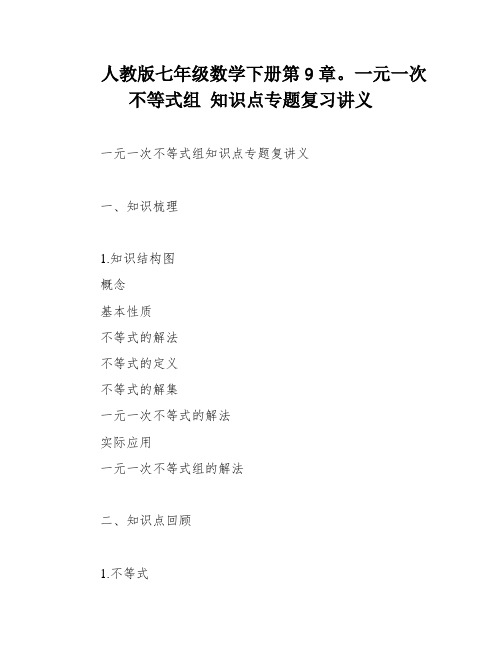
人教版七年级数学下册第9章。
一元一次不等式组知识点专题复习讲义一元一次不等式组知识点专题复讲义一、知识梳理1.知识结构图概念基本性质不等式的解法不等式的定义不等式的解集一元一次不等式的解法实际应用一元一次不等式组的解法二、知识点回顾1.不等式不等式是由不等号连接起来的式子。
常见的不等号有五种:“≠”、“>”、“<”、“≥”、“≤”。
2.不等式的解与解集不等式的解是使不等式成立的未知数的值。
不等式的解集是一个含有未知数的不等式的解的全体。
解集可以在数轴上直观的表示出来,具体表示方法是先确定边界点。
解集包含边界点,是实心圆点;不包含边界点,则是空心圆圈;再确定方向:大向右,小向左。
3.不等式的基本性质1) 不等式的两边都加上(或减去)同一个数或同一个整式,不等号的方向不变。
2) 不等式的两边都乘以(或除以)同一个正数,不等号的方向不变。
3) 不等式的两边都乘以(或除以)同一个负数,不等号的方向改变。
4.一元一次不等式一元一次不等式只含有一个未知数,且未知数的次数是1.系数不等于的不等式叫做一元一次不等式。
其标准形式为:ax+b<或ax+b≤,ax+b>或ax+b≥0(a≠0)。
5.解一元一次不等式的一般步骤1) 去分母;2) 去括号;3) 移项;4) 合并同类项;5) 化系数为1.删除格式错误的段落。
对于每段话,进行小幅度的改写,使其更加通顺易懂。
解一元一次不等式和解一元一次方程类似。
不同的是,一元一次不等式两边同乘以(或除以)同一个负数时,不等号的方向必须改变。
这是解不等式时最容易出错的地方。
例如,解不等式:-2/3x-1≤1/3解:去分母,得(3x-1)-2(3x-1)≤2(不要漏乘!每一项都得乘)去括号,得3x-3-6x+2≤2(注意符号,不要漏乘!)移项,得3x-6x≤2+3-1(移项要变号)合并同类项,得-3x≤4(计算要正确)系数化为1,得x≥-4/3(同除负,不等号方向要改变,分子分母别颠倒了)一元一次不等式组是含有相同未知数的几个一元一次不等式所组成的不等式组。
人教版七年级下册英语9单元知识点总结
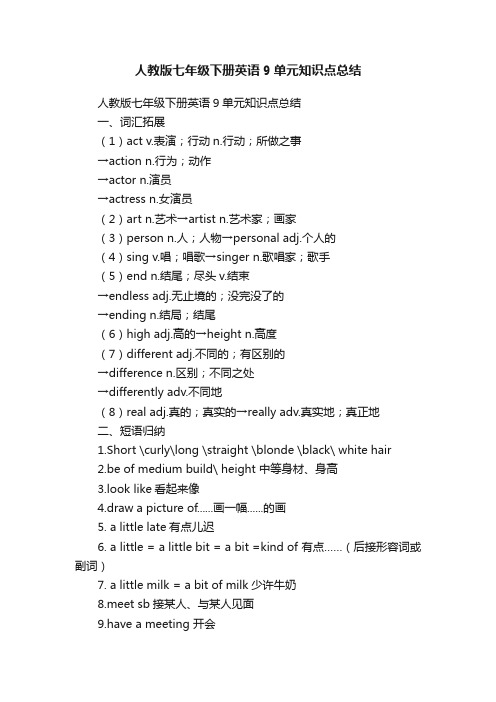
人教版七年级下册英语9单元知识点总结人教版七年级下册英语9单元知识点总结一、词汇拓展(1)act v.表演;行动n.行动;所做之事→action n.行为;动作→actor n.演员→actress n.女演员(2)art n.艺术→artist n.艺术家;画家(3)person n.人;人物→personal adj.个人的(4)sing v.唱;唱歌→singer n.歌唱家;歌手(5)end n.结尾;尽头v.结束→endless adj.无止境的;没完没了的→ending n.结局;结尾(6)high adj.高的→height n.高度(7)different adj.不同的;有区别的→difference n.区别;不同之处→differently adv.不同地(8)real adj.真的;真实的→really adv.真实地;真正地二、短语归纳1.Short \curly\long \straight \blonde \black\ white hair2.be of medium build\ height 中等身材、身高3.look like看起来像4.draw a picture of......画一幅......的画5. a little late有点儿迟6. a little = a little bit = a bit =kind of 有点……(后接形容词或副词)7. a little milk = a bit of milk少许牛奶8.meet sb接某人、与某人见面9.have a meeting 开会10.have a sports meeting 举行运动会11.in front of在……前面12.go to the cinema= go to the movies= see movies(去)看电影13.wear glasses= have glasses 戴眼镜14.a pair of glasses 一副眼镜15.be like 像...一样16.have blonde hair= wear blonde hair留着金黄色的头发17.a very interesting job一个非常有趣的工作18.a police artist警察艺术家19.talk to sb对某人说话20.look the same 看起来一样21.in the end = at last =finally最后,终于22.first of all首先23.sports shoes运动鞋24.be good at 擅长于25.like to do喜欢做26.remember doing sth 记得做过了某事27.remember to do sth记得要做某事28.stop doing sth停止做某事29.stop to do sth停下来去做某事30.be different from…与……不同三、知识点build(1)build作名词意为“体格,体型”例如:a man of strong build(2)build 作动词意为“建造,建设,建立”→building n.建筑物例如:We are building a house.四、知识点 a little bit , a bit&a little表示“有点,一点”时,三者可以通用。
七年级下册英语第九单元知识点(人教版)

Unit 9 How was your weekend?一、词组1.do one’s homework=do homework 做某人的家庭作业(do my homework 做我的家庭作业)2.play +运动或棋类(如:play soccer 踢足球play chess 下棋)3.play +the+乐器(如:play the guitar 弹吉他)4.clean my room 打扫我的房间5.go to the beach 去海滩6.go to the movies 去看电影7. on Saturday morning周六上午(in the morning/afternoon/evening 在早上/在下午/在晚上)[介词(prep): ① on + 具体的星期几/ 日期Eg: on Sundays/ July 7② in + 月/年/季节/世纪Eg; in July/ 2006/ summer/ 21century③ at + 具体钟点Eg; at 7:00]8. visit sb 拜访某人(visit my friend 看望我的朋友)9. study for the (math) test 准备(数学)考试10. do some reading 阅读(do+some+ving表示动作)[do some washing洗衣服do some cooking做饭do some shopping购物]11. stay at home 呆在家里12. have a party 举行一个晚会13. practice English 练习英语[practice (practiced) doing sth 练习做某事(类似用法:like, enjoy, have fun)]14.study geography 学习地理15. go shopping 去购物(go+v.ing 表示“去做某事”)[go swimming去游泳go boating去划船go climbing 去爬山]16. play computer games 玩电脑游戏17. go to summer camp 去夏令营18. go to the mountains 去爬山19. go for a walk 散步20.read a book about history 读一本历史书21.see an interesting talk show 看一个有趣的访谈节目22.write a new song 写一首新歌23. spend the weekend 度假[spend (spent) sometime / money (in) doing sth花费时间/金钱做某事spend (spent) sometime / money on sth 在某事上花费时间/金钱做某事]24. look for 寻找(的动作)find (found) 寻找(的结果)[Eg: I looked for everywhere but I couldn’t find my key.我找了所有的地方,都没有找到我的钥匙。
七年级下册第九章知识点

七年级下册第九章知识点七年级下册的第九章内容主要涉及人口与城市的关系、交通运输、工业与城市以及城市规划等方面的知识点。
在本章中,将会详细介绍这些知识点。
一、人口与城市的关系城市是人口的聚集区域,人口的数量会对城市产生影响,影响包括城市的建设、资源的利用以及城市规划等方面。
1.人口对城市建设的影响人口数量的增加会导致城市的扩张,城市的人口增加会促进城市基础设施的建造和更新,比如公路、桥梁、高速公路、城市轨道交通系统等。
此外,城市的扩张也需要新的住房区、医院、学校等公共设施的建设。
2.人口对城市资源的影响城市人口数量的增加会导致资源的压力增加,城市所需的资源包括用水、用电、排污处理等,如果城市的资源管理不善,就会导致城市环境污染和生态失衡。
3.人口对城市规划的影响城市规划是城市建设的重要环节,人口的数量和结构对城市规划也有重要影响。
城市规划需要考虑城市人口的年龄结构、性别比例、职业结构等因素,以便更准确地预测人口的需求和空间的需求。
二、交通运输交通运输是城市生活的重要组成部分,对于城市的经济、文化和社会发展有着重要的影响。
1. 城市公共交通系统城市公共交通系统是城市生活的基本组成部分,包括地铁、公交车、出租车等。
城市公共交通系统的建设需要考虑到城市规模、交通流量等因素。
2. 高速公路与城市道路网络高速公路是快速通行的重要道路,通常是在城市之间建设的。
在城市内,需要建设通行条件优良的道路网络,以便减少城市交通拥堵。
3. 新能源交通随着科技的进步,新能源交通已经逐渐进入人们的生活,如电动车、混合动力车等。
新能源交通的建设对城市绿色出行、节能减排等方面具有积极意义。
三、工业与城市工业是城市经济发展的重要支柱,与城市的发展密切相关。
在城市规划和建设过程中要考虑到工业对城市的影响。
1. 工业的布局工业的布局需要考虑到城市的交通条件、环境、安全等因素,为城市规划提供科学的指导。
2. 工业与城市的环境城市环境对工业的发展有着重要的影响,工业的排放物会对城市环境造成污染,需要采取有效的手段进行治理。
人教版七年级下册第九章第一节美国知识点总结

美国知识点一、地理位置以及领土构成1)构成:美国本土(48个州)+阿拉斯加州+夏威夷州(跨大洋洲和北美洲)2)半球位置:位于北半球和西半球;3)纬度位置:大部分处于北温带和亚热;4)美国本土一北温带和亚热带;阿拉斯加州一寒带和亚寒带;夏威夷州一一热带;(北回归线穿过夏威夷州,北极圈穿过阿拉斯加州,世界唯一跨热、温、寒三带的国家)5)海陆位置:美国本土三面临海,东临大西洋,西临太平洋,东南临墨西哥湾,美国北与加拿大相邻,西南与墨西哥相邻,阿拉斯加州临北冰洋和太平洋,夏威夷临太平洋。
二、美国的人种构成和民族1)人口和人种:其中白种人最多,形成统的美利坚民族。
2)人口2.78亿,土著居民是印第安人。
移民的白人、黑人和亚洲的黄种人经过长时间的隔蛤,形成统一的美利坚民族。
3)语言和宗教:英语是美国居民通用的语言,信奉的宗教是基督教。
4)华人、华侨聚居的城市。
5)人口分布不均。
三、美国地形美国的地形明显分为南北纵列的三大区:美国地形以平原为主,面积占全国总面积的一半以上。
美国地势特征:东西高、中部低。
四、美国气候类型及其分布1)气候:以温带大陆性气候为主2)降水分布规律:降水由东南向西北递减(受墨西哥湾、大西洋的影响)3)降水的水汽来源:墨西哥湾和大西洋五、世界上最大的淡水湖群、河流1)五大湖是世界最大的淡水湖群(苏必利尔湖、休伦湖、密歇根湖、伊利湖、安大略湖)苏必利尔湖是世界上面积最大的淡水湖;贝加尔湖是世界上淡水储水量最大、最深的湖泊。
2)河流:密西西比河,居世界第四位,是美国最长河流。
六、美国的自然资源及分布1)自然资源:美国的矿产、森林、草原等自然资源;2)分布:铁矿中要分布在五大湖附近;煤主要分布在阿巴拉契亚山区;石油主要分布在墨西哥湾沿岸;森林主要分布在美国东部的阿巴拉契亚山区。
七、美国的农业特点1)世界农业大国:许多农产品的产量和出口量居世界前列;2)农业现代化程度很高,农业生产实现机械化。
3)农业地区生产专业化。
人教版七年级下册第九单元知识点
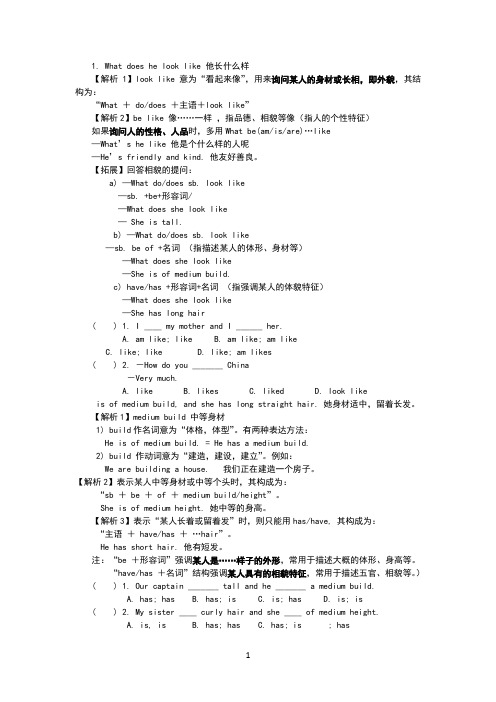
1. What does he look like 他长什么样【解析1】look like 意为“看起来像”,用来询问某人的身材或长相,即外貌,其结构为:“What + do/does +主语+look like”【解析2】be like 像……一样,指品德、相貌等像(指人的个性特征)如果询问人的性格、人品时,多用What be(am/is/are)…like—What’s he like 他是个什么样的人呢—He’s friendly and kind. 他友好善良。
【拓展】回答相貌的提问:a) —What do/does sb. look like—sb. +be+形容词/—What does she look like— She is tall.b) —What do/does sb. look like—sb. be of +名词(指描述某人的体形、身材等)—What does she look like—She is of medium build.c) have/has +形容词+名词(指强调某人的体貌特征)—What does she look like—She has long hair( ) 1. I ____ my mother and I ______ her.A. am like; likeB. am like; am likeC. like; likeD. like; am likes( ) 2. -How do you _______ China-Very much.A. likeB. likesC. likedD. look likeis of medium build, and she has long straight hair. 她身材适中,留着长发。
【解析1】medium build 中等身材1) build作名词意为“体格,体型”。
有两种表达方法:He is of medium build. = He has a medium build.2) build 作动词意为“建造,建设,建立”。
人教版七年级下册英语第九单元基础知识点

人教版七年级下册英语第九单元基础知识点Unit9 What does he look like?【重点单词】curly adj.卷曲的straight adj.直的tall adj.高的medium adj. 中等的height n.身高;高度of medium height 中等身高thin adj.瘦的heavy adj.重的build n.身材of medium build 中等身材tonight adv.&n.今夜little adj.小的a little 一点,少量cinema n.电影院glasses n.眼镜later adj.以后handsome adj.英俊的actor n.演员actress n.女演员person n.人nose n.鼻子blonde adj.金黄色的mouth n.嘴round adj.圆形的face n.脸eye n.眼睛singer n.歌手artist n.艺术家crime n.犯罪活动criminal n.罪犯put v.放each adj.&pron.每个,各自way n.方式,路线describe v.描述differently adv.不同地another adj.&pron另一,又一end n.结尾,尽头in the end 最后real adj.真正的;真实的jeans n.牛仔裤【重点短语】1.short hair短发2.long hair长发3.curly hair卷发4.straight hair直发5.(be)of medium height中等个子6.(be)of medium build中等身材7.go to the movies去看电影8.a little有点儿9.look like看起来像10.a big nose大鼻子11.a small mouth小嘴巴12.a round face圆脸13.black hair黑发14.big eyes大眼睛15.a long face长脸16.the same way同样的方式17.in the end最后18.blonde hair金黄色的头发【重点句型】1.I may be a little late.我或许要晚一会儿。
人教版七年级英语下册第九单元知识点归纳

人教版七年级英语下册第九单元知识点归纳Unit 9 What does he look like?◆短语归纳1. short hair 短发2. long hair 长发3. curly hair 卷发4. straight hair 直发5. (be) of medium height 中等个子6. (be) of medium build 中等身材7. go to the movies 去看电影 8. a little有点儿9. look like 看起来像10. a big nose 大鼻子11. a small mouth 小嘴巴12. a round face 圆脸13. black hair 黑发14. big eyes 大眼睛15. a long face 长脸16. the same way 同样的方式17. in the end 最后18. blonde hair 金黄色的头发19 a little bit =a little=kind of 一点儿… 20. a pop singer 一位流行歌手21. have a new look 呈现新面貌21. go shopping (do some shopping) 去购物21. the captain of the basketball team 篮球队队长22.one of --- ---中的一个23. be popular with sb 受某人欢迎24. stop to do sth 停下来去做某事25. stop doing sth 停止正在做的事情26. tell jokes/stories 讲笑话/ 讲故事27. have fun doing sth 愉快地做某事28. remember ( forget) to do sth 记得(忘记)做某事(没有做的)29. remember (forget) doing sth 记得(忘记)做过某事(已做)30.be +高矮胖瘦31.what do/does look like?=what +be +sb.+like?询问某人的外貌◆用法集萃1. What does / do + 主语+ look like? ……长得什么样?2. sb. + be + of + medium build / height 某人中等身材/个子3. sb. + has +… hair 某人留着……发4. sb. wears + clothes/glasses 某人穿着/戴着……◆典句必背1. —What does he look like? 他长什么样—He’s really tall. 他真的很高。
人教版英语七年级下册第九单元短语语法知识点总结说课讲解

Unit 9What does he look like?【短语归纳】1. short hair 短发2. long hair 长发3. curly hair 卷发4. straight hair 直发5. (be) of medium height 中等个子6. (be) of medium build 中等身材7. go to the movies 去看电影8. a little 有点儿9. look like 看起来像10. a big nose 大鼻子11. a small mouth 小嘴巴12. a round face 圆脸13. black hair 黑发14. big eyes 大眼睛15. a long face 长脸16. the same way 同样的方式17. in the end 最后18. blonde hair 金黄色的头发【用法集萃】1. What does / do + 主语+ look like? ……看上去什么样?2. sb. + be + of + medium build / height 某人中等身材/ 个子3. sb. + has +… hair 某人留着……发┃语法探究┃Ⅰ.形容词的排列顺序在英语中,当名词有多个形容词修饰时,就有它们的先后顺序。
下面的口诀可帮你记住这一先后顺序:限定描绘大、长、高,形状、年龄和新老;颜色、国籍跟材料,作用、类别往后靠。
注解1: “限定词”包括:冠词、物主代词、指示代词和数词,它位于各类形容词前。
它本身分为三位,即:前、中、后。
前位限定词有all、half、both、分数和倍数;中位限定词有冠词、指示代词、物主代词等;后位限定词有基数词和序数词,但序数词位于基数词前。
如:both my hands; all his income.注解2: “描绘”性形容词。
如:beautiful、bad、cold、great等。
人教版英语七年级下册第九单元知识点总结

人教版英语七年级下册第九单元知识点询问及描述外貌的表达讲义:例句:“The criminal is of medium height and young. He has long straight brown hair and big eyes,” says one woman. Another woman says, “No, he is tall and thin, and he has short straight brown hair. He's about thirty years old.”讲解:人物外貌的词汇总结(列举部分):tall(高的),short(矮的),medium(中等的);thin(瘦的),fat(胖的),heavy(重的),medium(中等的);short(短的),long(长的),straight(直的),curly(弯曲的);blonde(金黄色的),brown(棕色的),black(黑色的),gray(灰白色的)。
询问某人的外貌特征和长相的用语总结:What do you look like?或者What does he look like? 即用:What+助动词do/does+主语+look like?描述某人的外貌特征经常用以下两种方式来回答:1)主语+be+描述人外貌特征的形容词2)主语+have/has+名词(名词的前面有形容词修饰)例如:-What do you look like? -你长得怎么样?-I am tall and thin. -我又高又瘦。
-What does your mother look like? -你妈妈长得怎样?-She is tall. She has long hair. -她个子高,长头发。
注意:描述人或事物的特点、性质还可以使用“be+of+名词”结构。
描述外貌的其他方法:动词wear, have, with构成的介词短语等也常用来描述人的外貌。
七年级下册第9单元知识点

七年级下册第9单元知识点
七年级下册第9单元是关于体育方面的知识点。
这个单元主要
有三个章节:体育课、体育运动和户外体育活动。
在这三个章节中,我们可以学到很多关于体育方面的知识和技能,让我们的身
体更加健康和强壮。
下面让我们分别来介绍一下这三个章节的内容。
一、体育课
在这一章节中,我们主要学习了体育课的一些基本规则和注意
事项。
首先是体育装备的选择,我们需要根据不同的运动项目选
择不同的装备,以保证我们的安全和运动效果。
此外,我们还学
习了一些关于体育运动技能的基本方法和规则,如羽毛球、乒乓球、篮球和足球等。
通过学习这些知识,我们可以更加灵活和自
如地运动,提高我们的体育素质。
二、体育运动
在这一章节中,我们学习了很多不同的体育运动项目,如篮球、足球、游泳、跳绳、健身操等。
通过学习这些运动项目,我们可
以让我们的身体更加强壮,增强我们的体能和耐力。
此外,这些
运动项目还可以培养我们的协调性和团队合作精神,让我们更加
自信和勇敢。
三、户外体育活动
在这一章节中,我们学习了一些户外体育活动,如登山、露营、骑行等。
这些活动不仅可以让我们亲近大自然,放松我们的身心,还可以增强我们的勇气和毅力。
然而,户外活动也存在一定的危
险性,我们需要注意安全,做好充分的准备和防护。
总之,体育是我们生活中非常重要的一部分,通过学习和实践,我们可以获得更健康和积极的生活方式。
让我们一起加油,在体
育方面不断进步和发展!。
- 1、下载文档前请自行甄别文档内容的完整性,平台不提供额外的编辑、内容补充、找答案等附加服务。
- 2、"仅部分预览"的文档,不可在线预览部分如存在完整性等问题,可反馈申请退款(可完整预览的文档不适用该条件!)。
- 3、如文档侵犯您的权益,请联系客服反馈,我们会尽快为您处理(人工客服工作时间:9:00-18:30)。
1. What does he look like? 他长什么样?
【解析1】look like 意为“看起来像”,用来询问某人的身材或长相,即外貌,其结构为:“What +do/does +主语+look like?”
【解析2】be like 像……一样,指品德、相貌等像(指人的个性特征)
如果询问人的性格、人品时,多用What be(am/is/are)…like?
—What’s he like? 他是个什么样的人呢?
—He’s friendly and kind. 他友好善良。
【拓展】回答相貌的提问:
a) —What do/does sb. look like?
—sb. +be+形容词/
—What does she look like?
—She is tall.
b) —What do/does sb. look like?
—sb. be of +名词(指描述某人的体形、身材等)
—What does she look like?
—She is of medium build.
c) have/has +形容词+名词(指强调某人的体貌特征)
—What does she look like?
—She has long hair
( ) 1. I ____ my mother and I ______ her.
A. am like; like
B. am like; am like
C. like; like
D. like; am likes
( ) 2. -How do you _______ China?
-Very much.
A. like
B. likes
C. liked
D. look like
2.She is of medium build, and she has long straight hair. 她身材适中,留着长发。
【解析1】medium build 中等身材
1) build作名词意为“体格,体型”。
有两种表达方法:
He is of medium build. = He has a medium build.
2) build 作动词意为“建造,建设,建立”。
例如:
We are building a house. 我们正在建造一个房子。
【解析2】表示某人中等身材或中等个头时,其构成为:
“sb +be +of +medium build/height”。
She is of medium height. 她中等的身高。
【解析3】表示“某人长着或留着发”时,则只能用has/have, 其构成为:
“主语+have/has +…hair”。
He has short hair. 他有短发。
注:“be +形容词”强调某人是……样子的外形,常用于描述大概的体形、身高等。
“have/has +名词”结构强调某人具有的相貌特征,常用于描述五官、相貌等。
)( ) 1. Our captain _______ tall and he _______ a medium build.
A. has; has
B. has; is
C. is; has
D. is; is
( ) 2. My sister ____ curly hair and she ____ of medium height.
A. is, is
B. has; has
C. has; is
D.is; has
3. We’re meeting at seven, right?我们今晚七点见面,是吗?
现在进行时表将来表示按计划、安排将要发生的动作,常跟tomorrow, soon等表示将来的时间状语。
能用这种结构表示将来的动词往往是表示位移动词,如:
go, come, leave, arrive, start, begin, move, fly等
They are going to the village tomorrow.
My brother are coming to my home soon.
4.Yes , but I may be a little late. 是的,但我或许要晚点。
【解析1】a little, a bit, a little bit, a bit of
1) a little = a bit = a little bit 表示“有点”,后接形容词或副词。
It's a little hot today. 今天有点热。
2) a little = a bit of 表示肯定,意为“有一点”,后接不可数名词。
There is a little rain tomorrow. 明天有小雨。
拓展:little意为“几乎没有”,表示否定的含义。
There is little rain here in spring, so it's very dry. 春天几乎没下过雨,所以很干燥。
5.Well, he has brown hair and wears glasses. 他留着棕色的头发,戴眼镜。
【解析1】wear, put on, have on都表示“穿”,用法区别如下:
1) wear有“穿着;戴着”的意思,强调状态。
常用一般现在时表示经常状态,用进行时态表示暂时状态。
wear还可用来表示佩戴手表、首饰、徽章等以及留头发,胡须等。
2) put on有“穿上;戴上”,强调动作,是终止性动词短语,不能跟表示一段时间的状语连用。
3) dress的宾语通常是人,意思是“给……穿衣服”。
dress oneself 意为“给自己穿衣服”。
get dressed意为“穿好衣服”。
( ) 1. He always ______ black trousers and he always ______ his son in black.
A. dress; dress
B. wears; puts on
C. wears; dresses
D. puts on; wears
( ) 2. He likes _______ the red coat.
A. wearing
B. wears
C. putting on
D. dressing
【解析2】glass的用法
1) glass作“玻璃”讲时,为不可数名词。
Glass breaks easily. 玻璃易碎。
2) glass作“玻璃杯”讲时,为可数名词。
Please have a glass of water. 请喝杯水。
He handed the glasses of beer to his father. 他把那几杯啤酒递给了父亲。
3) glass作“眼镜”讲时,只用复数形式。
a pair of glasses 一副眼镜
He’s wearing a pair of glasses. 他戴着一副眼镜。
( ) I like wearing _______ in hot summer.
A. a glass
B. glass
C. some glasses
D. glasses
6. He has long straight brown hair. 他有着长长的棕色直发。
【解析】几个形容词修饰一个名词时的顺序:长短→形状→颜色。
She has short curly blonde hair.
7. He wants to draw a good picture of each criminal. 他想尽可能画出每一个罪犯的肖像画。
1) each做副词,意为“每一个”。
For boys, you can buy shirts for only 30 yuan each.
2) each做形容词,修饰名词时,名词要用可数名词单数形式。
Each boy has a pair of socks.
3)each做代词,可与of连用;做主语时,谓动词用单数。
Each of the boys has a pair of socks.。
